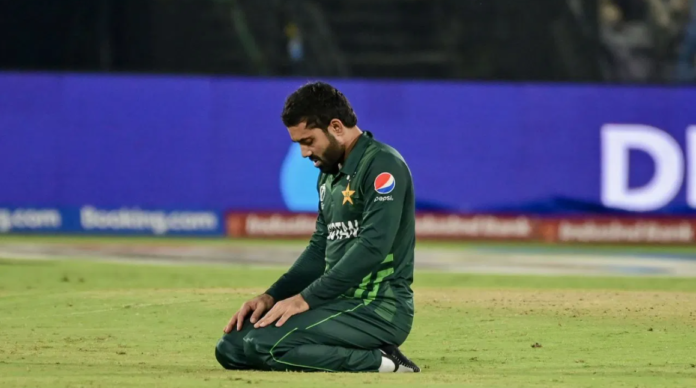It seems that many have overlooked the frequent sight of Mohammad Rizwan praying on the cricket field.
Sports should be the one arena where human passion is channeled positively. Yet, the harsh reality of our unequal world comes into play. In a recent incident, Pakistanis and some Indian citizens with strong ties to Pakistan made a small incident during the ongoing World Cup, particularly the India-Pakistan match on October 14 at Ahmedabad’s Narendra Modi Stadium, the world’s largest cricket stadium, seem monumental. India convincingly triumphed in this match against Pakistan.
In the aftermath of the defeat, disheartened Pakistani fans chose to highlight a fervent moment when some spectators at the stadium greeted Pakistani wicket-keeper-batsman Mohammad Rizwan with ‘Jai Shri Ram’ slogans. Subsequently, individuals in India who identify as Pakistanis, Leftists, and Islamists quickly launched into action. They directed their criticism towards the entire state of Gujarat and, by extension, India, alleging that the religious chants aimed at the unfortunate Rizwan were outrageous.
A Spiritual Act on the Cricket Field
The overlooked fact is that Rizwan has been frequently seen engaging in prayer on the cricket field, such as during the T20 World Cup 2021 India-Pakistan match in Dubai, which his team won. Although it’s possible that his prayers weren’t directed at the predominantly Hindu Indian team, it’s worth mentioning that Pakistan’s former cricketer Waqar Younis expressed delight in Rizwan’s act of prayer “in front of Hindus” and found it “special.” The global public’s reaction was understandably intense, leading Younis, affectionately known as Vicky, to offer a heartfelt apology for getting carried away by the moment’s excitement. It appears that the passion of the occasion…
The cricket match evoked emotions that extended well beyond the playing field, leading to a response that necessitated later reconciliation.
However, that was just one facet of the larger picture. In the same T20 World Cup match, Pakistani presenter Bazid Khan casually remarked to Pakistan’s team captain Babar Azam, “Kufr toot gaya,” a phrase interpreted by many fans as “idolatry being shattered.” The nonchalant manner in which such conversations transpired in their country became apparent as Azam responded with a smile, acknowledging that indeed, it was over.
But the narrative doesn’t conclude at this point. When we examine the everyday instances of bigotry against Hindus that have become normalized by prominent figures in Pakistan’s cricket, it becomes deeply concerning. The team, as a collective, appears to have difficulty distinguishing their sport from religious sentiments. It’s almost ambiguous whether they are engaging in a game or pursuing a religious mission.
Let’s examine a selection of statements from Pakistani cricketers:
- In 1978, Mushtaq Mohammed, the then captain of the Pakistan cricket team, referred to Pakistan’s test series victory against India as a “victory of Muslims worldwide over Hindus.”
- Former cricketer Shahid Afridi garnered attention for proudly stating that he smashed a TV after witnessing his daughter participate in the “aarti.”
- Shoaib Akhtar, in discussing the concept of Ghazwa-e-Hind, expressed intentions of capturing Kashmir and subsequently invading India.
Former captain of Pakistan’s national cricket team Inzamam-ul-Haq once stated, “If Muslims fully embrace their Islamic identity, there will be no non-Muslims left on Earth.”
The Intersection of Sport and Religion
Upon closer scrutiny, the deep-seated antipathy towards Hinduism and India among Pakistani players becomes evident. This sentiment runs so deep that during India’s tour of Pakistan, former Indian all-rounder Irfan Pathan was struck by an iron nail. Remarkably, he refrained from holding resentment or painting the entire nation with a broad brush due to the actions of a few. The inclination to blend religion with sports appears to be a long-standing pattern. Recently, Rizwan dedicated a portion of his match-winning performance to this cause.
From Hyderabad to Gaza, this trend becomes even more apparent. In an ideal situation, one might anticipate him dedicating his victory to the war-affected children of both Israel and Gaza in an effort to promote unity.
Rizwan took a stance, injecting religious and political conflicts into the world of sports. The audience in Ahmedabad reacted to this, conveying their feelings about Rizwan’s ongoing politicization of religion. In an ideal world, both Rizwan and the crowd have the right to express their viewpoints. Either Rizwan or the crowd could be asked to refrain from expressing their religious sentiments, or both should be allowed to do so, and we should move forward accordingly.
Have you ever observed an Indian cricketer, who represents the nation on the world stage, resorting to attacking another player’s faith or exploiting their profession to promote conversion? Such behavior carries a dismissive tone, implicitly suggesting that the other player’s faith is inferior and flawed. Remarkably, it’s not limited to India; even within various international cricket teams, like Afghanistan, such conduct is noticeably absent. Afghan cricketers are warmly embraced by Indian cricket fans.
Therefore, those who claimed that the chant ‘Jai Shree Ram’ harbors Islamophobia and hatred should consider the New Delhi cricket match between India and Afghanistan. The heartwarming reception of Afghan team captain Rashid Khan and the authentic affection he received from Indians, with the crowd cheering for him, exemplify how India welcomes him as one of its own.
I abstain from listing the names of more than 100 Muslim players who have represented the Indian cricket team, as doing so would be a sign of reverence for the nation. This stands in stark contrast to a neighboring state where, in exceedingly rare instances, like that of Hindu cricketer Danish Kaneria, individuals of different faiths face continuous targeting by their team members.
Let’s strive for a well-rounded perspective and evaluate matters objectively, without allowing left-leaning individuals or communists to pressure the average Indian with guilt.

